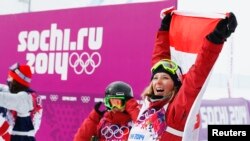The fourth day of competition at the Sochi Olympics Tuesday saw one of the biggest upsets at this year's Winter Games.
Swiss snowboarder Iouri Podladtchikov finished first in the men's halfpipe, depriving heavy favorite Shaun White, an American, of his third straight Olympic gold medal.
Japan's Ayumu Hirano and Taku Hiraoka won the silver and bronze, while White's fourth-place finish left him off the medals podium.
In Olympic events debuting in Sochi, Canada's Dara Howell and Germany's Carina Vogt made history. Howell took the gold in women's slopestyle skiing, and Vogt did so in the women's ski jump competition.
Howell was ecstatic after her victory.
"That really hasn't hit me yet," she said. "You know, that will go down in history! I'm so proud to represent my country, and that's huge for Canada. I'm happy to bring home another gold medal to Canada."
Norway, Germany Find Gold
Germany and Norway each won two gold medals Tuesday.
Vogt's teammate, Natalie Geisenberger, finished first in women's luge singles.
Two of Norway's Nordic skiers captured gold. Ola Vigen Hattestad won the men's cross-country sprint, and Maiken Caspersen Fallas did likewise in the women's event.
Darya Domracheva of Belarus won the women's 10-kilometer biathlon pursuit, becoming the first female Belarusian to capture a Winter Olympic gold.
South Korea's Lee Sang-hwa finished first in women's 500-meter speedskating, setting two Olympic records in the process.
Norway, Canada and Germany are now tied for the most gold medals with four. Norway leads Canada in the overall medal count, 11-9, followed by the Netherlands with eight.
Sochi Unseasonably Warm
Meanwhile, Olympic officials discussed the spell of warm weather that has affected events in Sochi.
Athletes have voiced concerns that melting and soft snow is hampering their ability to compete. On Tuesday, a training session for Alpine skiing downhill was canceled to protect the snow, while mild weather conditions meant a slushy track in Nordic Combined.
The head of the Sochi Olympics, Dmitry Chernyshenko, said there is no need yet to use emergency snow reserves at mountain venues.
"You know that we had a special program to secure the snow, and the snow is still in some reservoirs that survived over the previous summer," Chernyshenko said. "So in case we will need some snow we can use it from our reservoir."
In Sochi, a Black Sea resort city with a subtropical climate, the average February temperatures are around 10 degrees Celsius. But on Monday, the high was about 16, and after a brief cool down, they could return to the mid-teens on Thursday.
Those conditions have put Sochi on track to be the warmest Winter Olympics in history.
Swiss snowboarder Iouri Podladtchikov finished first in the men's halfpipe, depriving heavy favorite Shaun White, an American, of his third straight Olympic gold medal.
Japan's Ayumu Hirano and Taku Hiraoka won the silver and bronze, while White's fourth-place finish left him off the medals podium.
In Olympic events debuting in Sochi, Canada's Dara Howell and Germany's Carina Vogt made history. Howell took the gold in women's slopestyle skiing, and Vogt did so in the women's ski jump competition.
Howell was ecstatic after her victory.
"That really hasn't hit me yet," she said. "You know, that will go down in history! I'm so proud to represent my country, and that's huge for Canada. I'm happy to bring home another gold medal to Canada."
Norway, Germany Find Gold
Germany and Norway each won two gold medals Tuesday.
Vogt's teammate, Natalie Geisenberger, finished first in women's luge singles.
Two of Norway's Nordic skiers captured gold. Ola Vigen Hattestad won the men's cross-country sprint, and Maiken Caspersen Fallas did likewise in the women's event.
Darya Domracheva of Belarus won the women's 10-kilometer biathlon pursuit, becoming the first female Belarusian to capture a Winter Olympic gold.
South Korea's Lee Sang-hwa finished first in women's 500-meter speedskating, setting two Olympic records in the process.
Norway, Canada and Germany are now tied for the most gold medals with four. Norway leads Canada in the overall medal count, 11-9, followed by the Netherlands with eight.
Sochi Unseasonably Warm
Meanwhile, Olympic officials discussed the spell of warm weather that has affected events in Sochi.
Athletes have voiced concerns that melting and soft snow is hampering their ability to compete. On Tuesday, a training session for Alpine skiing downhill was canceled to protect the snow, while mild weather conditions meant a slushy track in Nordic Combined.
The head of the Sochi Olympics, Dmitry Chernyshenko, said there is no need yet to use emergency snow reserves at mountain venues.
"You know that we had a special program to secure the snow, and the snow is still in some reservoirs that survived over the previous summer," Chernyshenko said. "So in case we will need some snow we can use it from our reservoir."
In Sochi, a Black Sea resort city with a subtropical climate, the average February temperatures are around 10 degrees Celsius. But on Monday, the high was about 16, and after a brief cool down, they could return to the mid-teens on Thursday.
Those conditions have put Sochi on track to be the warmest Winter Olympics in history.





